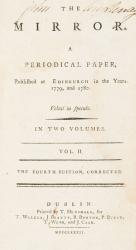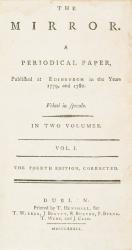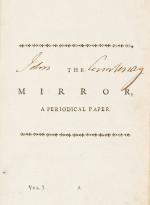[Mirror Club, The Mirror - A Periodical Paper, Published at Edinburgh in the Yea
The Mirror – A Periodical Paper, Published at Edinburgh in the Years 1779 and 1780 [″Veluti in Specula”].
Fourth Edition overall [First Dublin Edition]. In Two Volumes (complete set). Dublin, Printed by T.Henshall for T.Walker, 1782. Small Octavo (10 cm x 18 cm). VI, 288, VIII, 288 pages. Hardcover / Original 18th century leather with new spinelabels, made to style. Both Volumes now in protective Mylar. Some minor wormhole-damage to the last 20 pages of Volume Two.Minor lesions to some pages only. Faded dampstain to both Volumes. Still, both Volumes firm and complete. Important scottish enlightenment publication. From the library of one “John Courtenay”, with his name in ink on the titlepages of both Volumes. This is possibly John Courtenay (22 August 1738 – 24 March 1816), who was an Irish officer in the British Army, later becing a politician in England. He was a Whig member of Parliament (MP) at Westminster from 1780 to 1807, and again in 1812. (Wikipedia)
With interesting articles, especially on Female Matters of the 18th century: On Duelling (Regulations proposed) – Story of Captain Douglas / Remarks on the Poems of Ossian / Of Beauty – Philosophical Opinions of it / The Mussulman’s Mirror / Censure of a particular piece of indecorum at the theatre / Of Female Manners / (Change to those of Scotland considered) / Description of a Tour through the Highlands, by a London Family / Of Education – A classical contrasted with a fashionable education / Description of a shopkeeper virtuoso, in a letter from his wife Rebecca Prune / Distresses of the families of Soldiers – Story of Nancy Collins / Danger of too refined an education to girls in certain circumstances, in a letter from Harriet B. / Behaviour of Great LAdies in town to their country acquaintance, in a letter from Elizabeth Homespun / Recital of a conversation critcism on the Tragedy of Zara / The Hardship of educating a young lady in an expensive manner and then leaving her with a very slender provision for her support; History of herself, by S.M. / Account of a younger brother in the country, in a letter from Joseph Fielding / Essay on Dreams / Of the privilege of fashion to alter nature; some accountof certain fashionable peculiarities in Edinburgh / Antiquarius on the Virtues of certain ancient medicines / On Superstition and the Fear of Death / Emilia on Female accomplishment / etc. etc.
Mirror Club (act. 1776–1787), a prominent group of Scottish literati who published the Edinburgh journals The Mirror (1779–80) and The Lounger (1785–7), evolved from a small Edinburgh literary debating society known as the Feast of Tabernacles (1770–77). The latter was a self-selected group of young writers, lawyers, preachers, and landed scions whose acknowledged leader was the politician Henry Dundas. Many of these individuals had earlier belonged to the Belles Lettres Society (1759–63), the junior version of the Select Society, a famous grouping of Scottish politicians, philosophers, preachers, and writers.
In its early evolution from the Feast of Tabernacles about 1776–7, the founding members of the Mirror Club included Henry Mackenzie, William Craig, Alexander Abercromby, William Macleod Bannatyne, and Robert Cullen. Other members from this time were the lawyers George Ogilvie (d. 1785), William Gordon of Newhall (d. 1778), and George Home of Wedderburn (1734–1820). Later corresponding members, who contributed essays or correspondence, included James Beattie, David Dalrymple, William Greenfield, Robert Henry, David Hume (bap. 1757, d. 1838), William Richardson, William Strahan, Alexander Fraser Tytler, and his father, William Tytler. The publisher and future lord provost of Edinburgh, William Creech, whose idea it was to publish The Mirror, should be considered an ex officio club member since he was the only contact for many of the correspondents. Any forced division between core and corresponding members is somewhat misleading, however, since Dalrymple, Richardson, and Alexander Fraser Tytler made a far greater contribution to the club’s publications than certain full members. Tytler, in fact, became one of the club’s principal essayists.
The Mirror Club’s ethical essays—which copied the form and continued the function of The Spectator (1711–14) of Addison and Steele—appear to have been well received. Macleod Bannatyne reported that 400 copies of each issue were printed, the same number that was recorded in Eminent Scotsmen by William Chambers. This number significantly underestimates the number of actual readers in an age when paper periodicals were widely circulated. Many of the club’s essays were printed elsewhere, with twenty-three papers and one poem appearing in the Caledonian Mercury, the Scots Magazine, and The Bee. The bound collection of The Mirror went through eleven editions prior to 1802 and The Lounger six editions before 1805. While no subscription lists have been found, acknowledged subscribers included James Beattie, William Strahan, Dugald Stewart, John Home, William Richardson, Hugh Blair, and Jane Gordon, duchess of Gordon.
The indisputable driving force of the Mirror Club was Henry Mackenzie, who, from his early years, had been groomed by the Edinburgh literati to succeed David Hume as their convivial leader and adjudicator of literary taste. Mackenzie composed 49 of the 110 issues of The Mirror and 62 of the 101 issues of The Lounger. Occasionally he composed several different drafts of a paper that he sent to friends, including Adam Smith, for comment. He also revised the majority of the essays for publication. Three of Mackenzie’s closest friends, William Craig, Alexander Abercromby, and Alexander Fraser Tytler, accounted for 68 of the remaining 100 essays.
As a microcosm of the Scottish literati the publishing arm of the Mirror Club provides valuable insights into the socio-economic agenda, professional background, and inter-generational networks of landed and literary lowland society. All club members came from families well connected to Scotland’s élite by status, interests, marriage, and profession. They viewed themselves as the legal and literary representatives of Scottish landed society, and they believed that a united and enlightened class of landowners could lead the country out of its economic backwater. Along with their teacher and, in the case of Mackenzie and Craig, their friend Adam Smith, the core members of the Mirror Club shared a vision of Scotland as an improving capitalist community where economic and social power was held by the owners of land and where the status quo was strengthened by a complicated system of patronage deployed by Henry Dundas. The agrarian nature of Scottish improvement was strongly endorsed by club members. The liberal Macleod Bannatyne and conservative Abercromby composed a series of essays on the corruption of rural values by urban fashion. Other issues were thinly disguised warnings against the upward mobility of Scotland’s urban merchant classes, and paeans to the independence and gentility of landowners. On landed estates gentlemen could continue to perform the roles of patriarchs over small leaseholders, while maintaining a happy and deferential retinue of servants. This gentrified world was personified by Home and Tytler, who preferred to live and write from their estates, as well as by Macleod Bannatyne’s memorable character Umphraville.
A competing interest group within the membership came from the legal profession. Two young lawyer members were George Ogilvie and William Gordon of Newhall, though neither published an essay in The Mirror. Gordon died on 11 January 1778, a year before its appearance, while Ogilvie died shortly before the initial publication of The Lounger in 1785. George Home of Wedderburn was already establishing himself in Edinburgh’s legal community when The Mirror first appeared. He served for more than thirty years as principal clerk of the court of session, where he was eventually succeeded by Sir Walter Scott. He was also elected a fellow of the Royal Society of Edinburgh. As befitted his status and seniority in legal circles, Home had the privilege of composing the first Mirror essay, and later contributed on staple club themes such as the value of social affection and personal cheerfulness (see no. 34). In the prominence given to the legal profession the club demonstrated a clear preference for law over the church. Nevertheless, clergymen such as John Logan were prominent in the Feast of Tabernacles, and the connection between the ‘moderate’ party of the Church of Scotland and the revival of Scottish belles-lettres was retained in Lounger essays by William Greenfield and Robert Henry. Moreover, many Mirror papers, including Mackenzie’s famous series ‘The story of La Roche’ (nos. 42–4), advocated religious belief and feeling.
In terms of form and style the Mirror Club’s offerings were self-conscious imitations of The Spectator, Mackenzie proudly earning the epithet of the Scottish Addison. However, it is evident that the club also developed the essay genre and championed the new literary form of the novel as the moral preceptor of the modern age. At one level the club’s thinking remained parochial and transitional, providing advice to a Scottish élite that was distinctly hierarchical and yet sufficiently poor to provide greater social and economic mobility than its English counterpart. But in its literary output the club also aimed to create a revolutionary new paradigm for ethical and cultural analysis by delineating the progress of individual character and passions through the structures of civilized manners, formal education, and custom. Nowhere was this more forcefully advanced than in the club’s re-evaluation of Shakespeare as the creator of unique individuals with complex personalities. The club’s attention to the philosophical analysis of Shakespeare was continued by Schlegel, Coleridge, and Hazlitt, to name a few. Improving, humane, and tolerant, the Mirror Club popularized Enlightenment values principally among the Scottish gentry. Yet, collaterally, the club and its publications provided a far wider readership with an innovative characterization of Scottish identity—one that affirmed the ethical and sociable community rather than the uniquely covenanted nation. (Source: Oxford Dictionary of National Biography – Article by John Dwyer)
- Keywords: 18th Century – Irish Country House Library · 18th Century – Rare · Catalogue Fourteen – 18th Century History · Catalogue Nineteen – English Literature before 1850 · Catalogue No.10 – International Literature · Catalogue Three – Literature by Women · English History in the 18th century · English Literature – Rare · English Literature of the 18th Century · Irish History – Rare · Mirror Club [Scotland] · Periodicals Rare · Scottish Authors · Scottish Enlightenment · Scottish History · Scottish History Rare · Scottish Literature · Women in History – Rare · Women in Scottish Society
- Language: English
- Inventory Number: 29831AB
EUR 780,--
© 2024 Inanna Rare Books Ltd. | Powered by HESCOM-Software
















